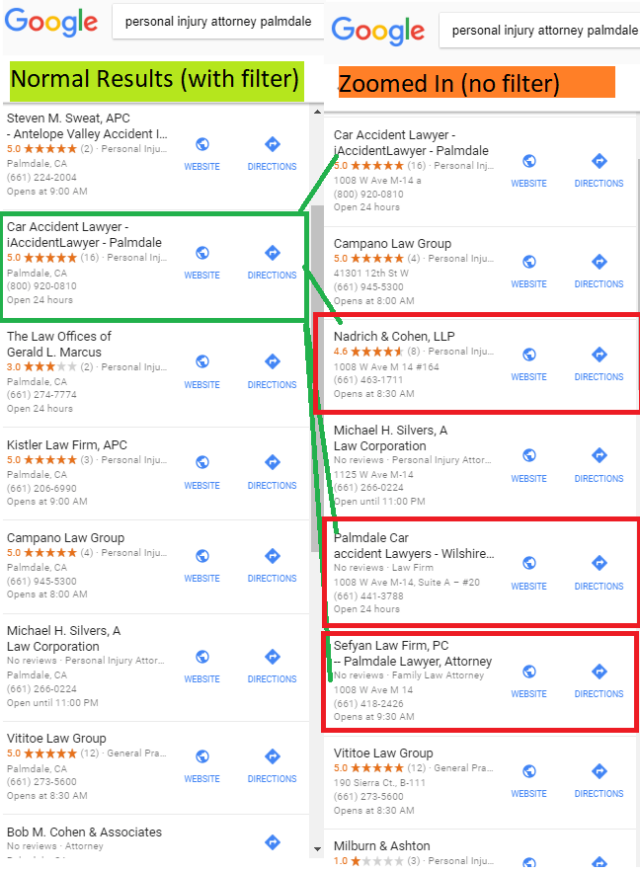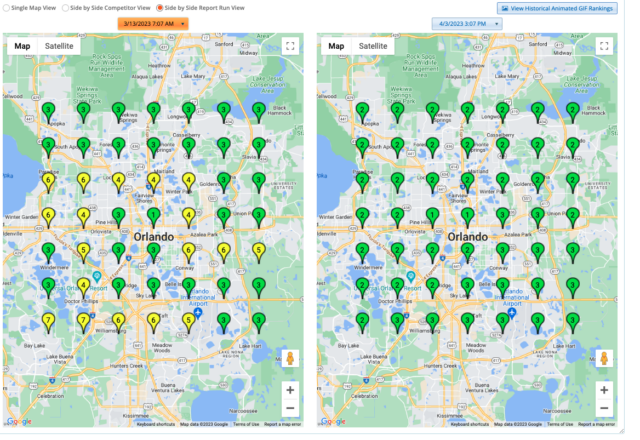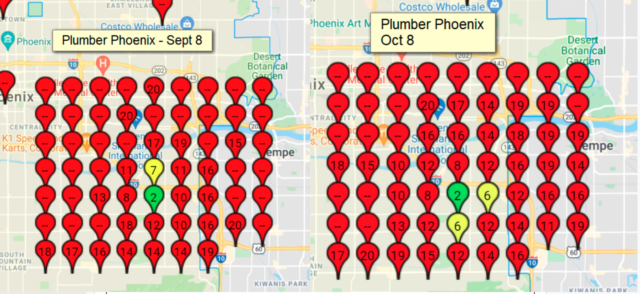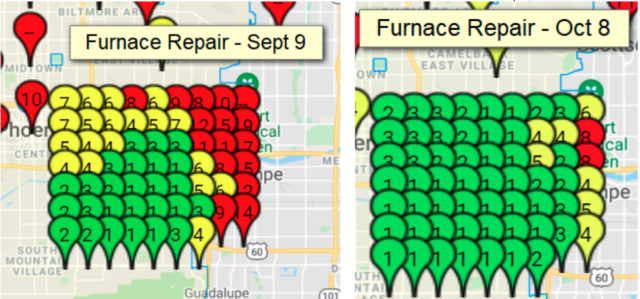Google Business Profile (GBP) is all about one thing: LOCATION, LOCATION, LOCATION! Business owners who care about ranking well in Google Maps know that the location of their business is a major ranking factor and thus, many people are looking for the best lease space in the center of their city to get an office.
Prime real estate is hard to come by and often this means leasing an office space in a building with dozens of other businesses. It’s not just offices either, all sorts of businesses often run from one location. Think spas inside a hotel, for instance.
When you have multiple businesses located at one address, things can get messy on Google Maps very quickly.
There are many important things to know about managing your Google Business Profile(s) when you have multiple businesses at one location. The golden question, then, is “how do I do it?”. And, as we always say in SEO, “it depends.”
So, I’m going to talk you through a few scenarios that will help you understand how Google treats businesses located at the same address. And, how you can best manage your local business listing if it’s located at the same address with other businesses.
Many Different Businesses – One Address
Generally there are no issues in having your Google Business Profile (GBP) verified to an office building with multiple businesses in it. If none of the businesses near you are in your industry, or in direct competition for any of your services, you should have no issues showing on Maps.
Where things get tricky is if there is a business in your industry located a bit too close to your physical address, i.e. in the same building, or in an adjacent building. In this case, you could run into issues with Google’s local filter and your listing will not rank as well as it could.

All About the Local Filter
We all know the primary category is one of the most important ranking factors on GBP listings and picking the right one is extremely important.
Wait, what’s the local filter?
What many people don’t know is that if two businesses are physically located at the same address, and they have the same category, they are going to be impacted by Google’s local filter. Before you ask, no, adding a suite number does not consider it a separate address according to Google.
Essentially, the local filter is kind of like the organic filter in the sense that it filters things it considers to be similar or duplicates. The local filter will filter out listings based on:
- main category
- URL & business name
- address & proximity
Google will choose the listing with the highest ranking authority for that particular keyword to rank and then omit any other listings at that address from ranking.
For example, there are two attorneys at one address. One of the attorneys ranks for “personal injury attorney Palmdale,” but the other attorney ranks for “auto accident attorney Palmdale.” However, both will not rank for the same keyword at the same time.
For each search, Google will choose one listing to rank and then the other listing(s) will typically not rank at all. Listings can be filtered for one keyword without being filtered for others and vice versa. In a similar way to organic search, the local filter picks the “best” listing and filters out other listings that are too similar.
What To Do If You’re Being Affected by The Local Filter
To get unfiltered, you need to increase your relevance to that particular keyword. This can be done in many ways, including:
- Checking the categories on the listings that rank and see if you are missing any relevant ones.
- Consolidating duplicate listings (if you have them).
- Increasing the organic ranking of the entire domain for that keyword. This can make a huge impact.
- Rebrand your business to include keywords in your business name—legally or with a DBA. This is the best way to get keywords in your GBP business name without violating Google guidelines.
If none of the above works well enough and it’s feasible, moving your office location is the best way to get unfiltered. Here is an example of geo-grid rankings results for a listing that was being filtered versus rankings after becoming unfiltered.

Moving Your Address? Make Sure You Avoid the Filter
If you are looking to move your office to help local map rankings, I implore you to take a look at the current businesses in your potential new office building. You want to make sure that no competitor in your industry, especially if they are using the same primary category in their GBP, is in the same building or an adjacent building. This way you can avoid the local filter and give your listing the best chance for maximum search visibility.
Be Careful With Practitioner Listings
One industry that I’ve noticed has a ton of issues with the local filter is real estate. It seems every realtor in the industry has a practitioner listing, which is totally allowed per Google Business Profile guidelines.
The problem is they are usually all verified to the same address, typically the brokerage where they work.
I almost always recommend that these realtors create the practitioner listings at their home address and then hide the address. Likewise with those already established on Maps, I’d advise them to “move” to their home address and away from all the other practitioners.
This is because if you create a bunch of realtor practitioner listings at the same address, they’re all going to dilute the authority of each other and none of them are going to rank very far away.
The same is true with lawyers, financial advisors, insurance agents, and other professionals that are allowed to create practitioner listings per Google’s guidelines. Quality is more important than quantity in most cases, especially when you have two business listings that are located too close to each other—they’re not serving you any better than one listing could.
Are Two GBP Listings Better Than One? Not Always.
Still, I’ve run into the scenario a few times where a business owner has two separate businesses located at the same address, or multiple practitioners verified to the same address. In some cases this would be a viable strategy if the businesses are in two separate industries and their services do not overlap at all.
It’s also very important to make sure that, if you have two listings that are using the same address, they have legally distinct names and business proof showing that they are legally distinct businesses. You also need to have different phone numbers and, if possible, different websites to distinguish the two businesses to help safeguard any potential action Google can take to merge the business listings.
Word of warning
If Google thinks two listings are too similar, even if they have different categories, Google can mark one as duplicate and merge the listings without warning. This merge cannot be undone by Google support, so taking action to prevent it is crucial. If it does happen though, don’t panic, it’s not always a bad thing to be merged!
The Magic of Merging GBPs!

Take, for example, this client we worked with that does HVAC and plumbing. When they came to us, they had a listing with “HVAC” as the main category and then another listing with “plumber” as the main category. They were hoping to rank for HVAC terms with the HVAC listing and to rank for plumbing terms with the plumber listing.
However, right as they signed on with us Google merged the two listings without warning because they had the same address and similar names. Surprisingly, we found that after the merge the HVAC listing was now ranking slightly better for plumbing keywords than the plumbing listing had been—albeit they weren’t ranking well before, it was a win!
So even though they weren’t able to use “plumbing” as their main category, due to the authority of the HVAC listing, they were now doing better for plumbing and HVAC terms with one listing than they were with two, because their rankings for “furnace repair” and other HVAC terms increased quite a bit post-merge!

Take Time to Plan for a New GBP. More Is Not Always Better!
Managing a business listing on Google Business Profile can require significant time and effort to get it to rank well and perform. It is crucial to plan and conduct research when expanding to new locations or optimizing your current ones to ensure that you are not—and will not—be negatively impacted by the local filter. If you don’t, your carefully optimized listing(s) can be missing from results for key searches.




